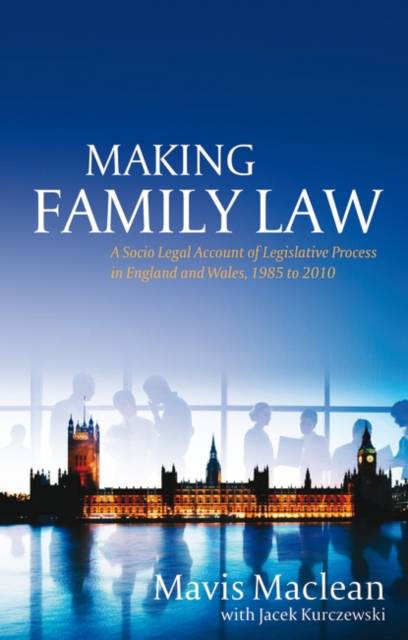
- Afhalen na 1 uur in een winkel met voorraad
- Gratis thuislevering in België vanaf € 30
- Ruim aanbod met 7 miljoen producten
- Afhalen na 1 uur in een winkel met voorraad
- Gratis thuislevering in België vanaf € 30
- Ruim aanbod met 7 miljoen producten
Making Family Law
A Socio Legal Account of Legislative Process in England and Wales, 1985 to 2010
Mavis MacLean, Jacek KurczewskiOmschrijving
The legislative process is complex, encompassing a variety of aims and outcomes. Some norms and rules are embodied in law because we are simply expected by government to follow them. Others are there for entirely different reasons. A legislator may wish to send messages about what constitutes desirable behaviour, to demonstrate government's ability to deal with a local and short-term issue or to distract the electorate from other crises. Law is often, though not always, designed as a means to an end. Taking a sociological and empirically-based approach, this book offers a rare insight into the real processes by which lawmakers attempt to influence (or fail to influence) human behaviour.
This account of the legislative process in Westminster rests on the author's observations and discussion with key players from the standpoint of an academic adviser on research to the department responsible for family law-making (originally the Lord Chancellor's department, then the Department for Constitutional Affairs and now the Ministry of Justice) and draws on her longstanding involvement in and knowledge of the processes of law-making. Documenting the little understood processes that occur in Whitehall, in particular how ministers, advisers and officials work together, it reveals a quite different picture from that of the rational lawmaker imagined in textbooks. Instead what emerges is an empirically-based view of the aims and functions of statute law including the different forms and relevance of symbolic legislation and a realistic view of what law aims to accomplish and what can be done in practice.Specificaties
Betrokkenen
- Auteur(s):
- Uitgeverij:
Inhoud
- Aantal bladzijden:
- 132
- Taal:
- Engels
Eigenschappen
- Productcode (EAN):
- 9781849462273
- Verschijningsdatum:
- 30/06/2011
- Uitvoering:
- Hardcover
- Formaat:
- Ongenaaid / garenloos gebonden
- Afmetingen:
- 142 mm x 216 mm
- Gewicht:
- 294 g

Alleen bij Standaard Boekhandel
Beoordelingen
We publiceren alleen reviews die voldoen aan de voorwaarden voor reviews. Bekijk onze voorwaarden voor reviews.











